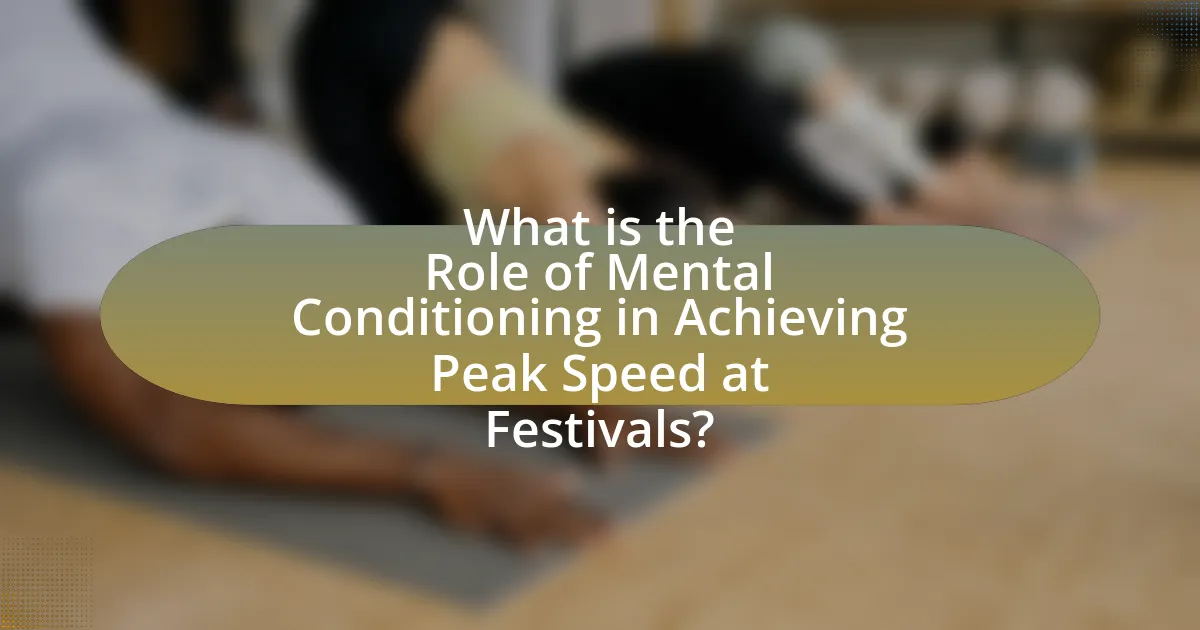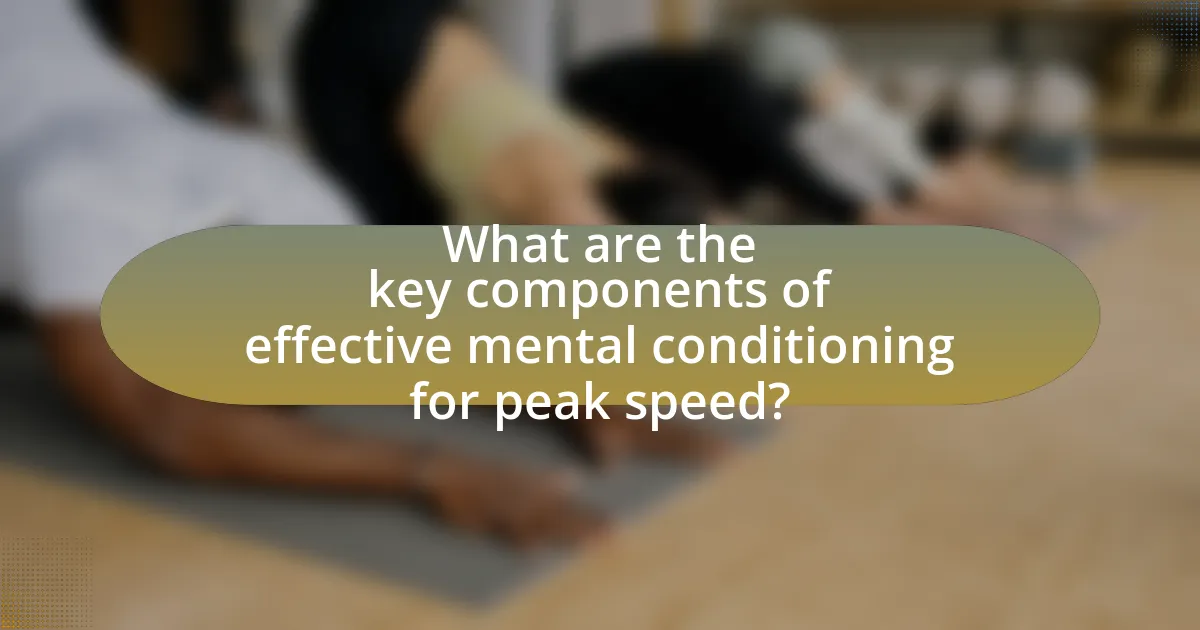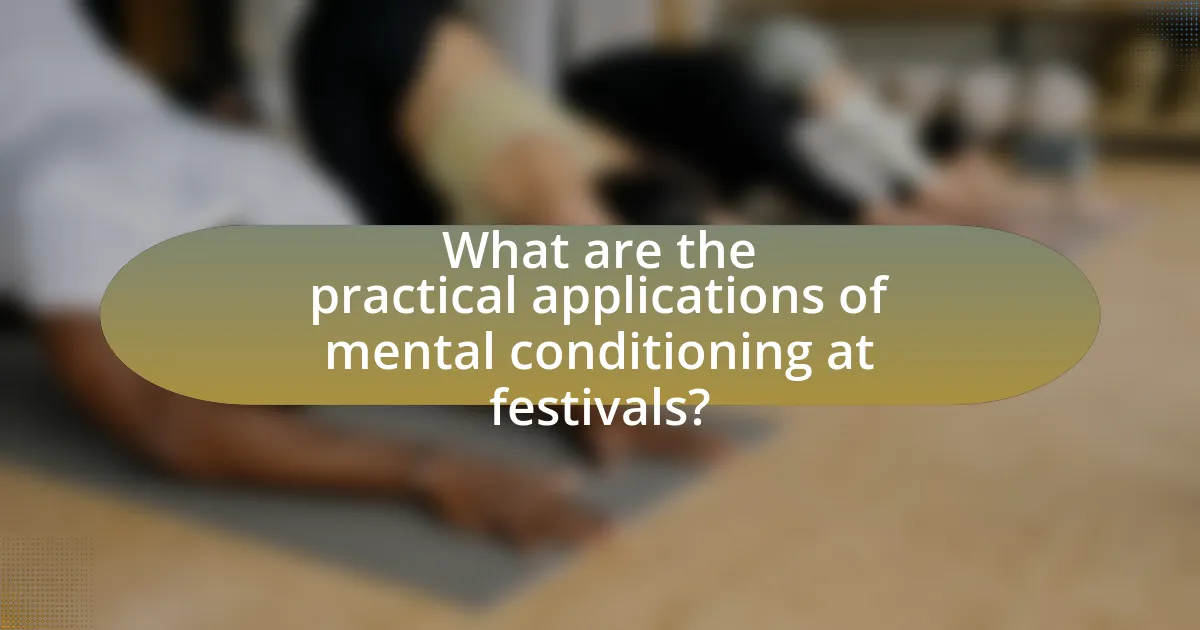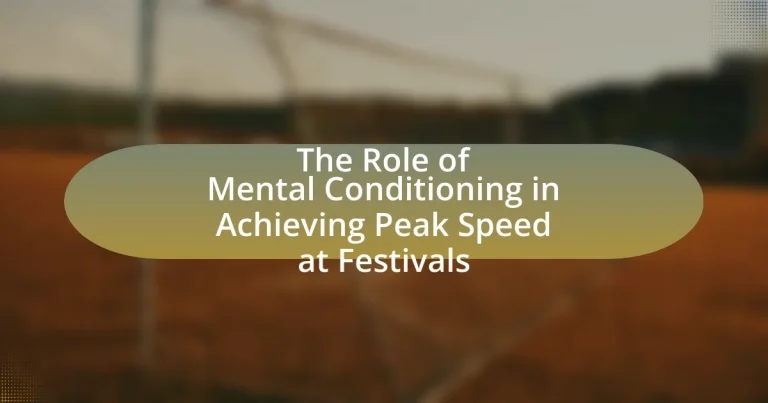Mental conditioning is essential for athletes aiming to achieve peak speed at festivals, as it enhances focus, reduces anxiety, and improves overall performance. Techniques such as visualization, positive self-talk, and goal setting are critical components that help athletes manage psychological pressures and optimize their physical capabilities. Research indicates that mental conditioning can lead to significant improvements in performance metrics, with athletes reporting increased confidence and resilience in high-pressure environments. The article explores the psychological challenges faced by athletes during festivals and provides practical strategies for implementing effective mental conditioning techniques to overcome these barriers and enhance performance outcomes.

What is the Role of Mental Conditioning in Achieving Peak Speed at Festivals?
Mental conditioning plays a crucial role in achieving peak speed at festivals by enhancing focus, reducing anxiety, and improving overall performance. Athletes who engage in mental conditioning techniques, such as visualization and positive self-talk, can better manage the psychological pressures associated with competitive environments, leading to improved speed and efficiency. Research indicates that mental training can lead to a 10-20% increase in performance metrics, demonstrating its effectiveness in optimizing physical capabilities during high-stakes events like festivals.
How does mental conditioning influence athletic performance at festivals?
Mental conditioning significantly enhances athletic performance at festivals by improving focus, reducing anxiety, and fostering resilience. Athletes who engage in mental conditioning techniques, such as visualization and positive self-talk, can better manage the unique pressures of competitive environments, which are often heightened at festivals due to large crowds and heightened expectations. Research indicates that athletes who practice mental conditioning report increased confidence and improved performance metrics, such as speed and endurance, during competitions. For instance, a study published in the Journal of Sports Psychology found that athletes who utilized mental imagery techniques improved their performance by an average of 10% in high-pressure situations. This evidence underscores the critical role mental conditioning plays in optimizing athletic performance in festival settings.
What psychological techniques are used in mental conditioning?
Psychological techniques used in mental conditioning include visualization, positive self-talk, and goal setting. Visualization involves creating mental images of successful performance, which has been shown to enhance actual performance by activating similar neural pathways as physical practice. Positive self-talk helps athletes maintain motivation and focus, reducing anxiety and improving confidence. Goal setting provides clear objectives, which can enhance motivation and performance by creating a structured approach to training. Research indicates that these techniques can significantly improve athletic performance, as evidenced by studies showing that athletes who employ these strategies often outperform those who do not.
How do these techniques enhance speed and performance?
Mental conditioning techniques enhance speed and performance by optimizing focus, reducing anxiety, and improving motivation. These techniques, such as visualization and positive self-talk, help athletes mentally prepare for high-pressure situations, allowing them to execute their physical skills more effectively. Research indicates that athletes who engage in mental conditioning can experience a 10-20% improvement in performance metrics, as evidenced by studies showing enhanced reaction times and decision-making abilities during competitions.
Why is mental conditioning important for athletes at festivals?
Mental conditioning is crucial for athletes at festivals because it enhances focus, resilience, and performance under pressure. Festivals often present unique challenges, such as distractions from the environment and heightened competition, which can impact an athlete’s ability to perform optimally. Research indicates that mental conditioning techniques, such as visualization and mindfulness, can significantly improve an athlete’s mental toughness and ability to manage stress, leading to better performance outcomes. For instance, a study published in the Journal of Sports Psychology found that athletes who engaged in mental conditioning reported higher levels of confidence and lower anxiety, directly correlating with improved performance metrics during competitions.
What are the psychological challenges faced by athletes during festivals?
Athletes face several psychological challenges during festivals, including performance anxiety, pressure to succeed, and distractions from the festive environment. Performance anxiety can lead to decreased focus and impaired performance, as athletes may fear judgment from spectators and peers. The pressure to succeed often stems from personal expectations or external demands, which can heighten stress levels and impact mental well-being. Additionally, the festive atmosphere can introduce distractions that disrupt an athlete’s routine and concentration, making it difficult to maintain optimal mental conditioning. These challenges can significantly affect an athlete’s ability to achieve peak speed and performance during competitions at festivals.
How can mental conditioning help overcome these challenges?
Mental conditioning can help overcome challenges related to achieving peak speed at festivals by enhancing focus, resilience, and performance under pressure. Through techniques such as visualization, positive self-talk, and mindfulness, athletes can train their minds to maintain concentration and manage anxiety, which are critical during high-stakes events. Research indicates that mental conditioning practices can lead to improved performance metrics; for instance, a study published in the Journal of Sports Psychology found that athletes who engaged in mental conditioning techniques experienced a 10% increase in performance efficiency compared to those who did not. This evidence supports the effectiveness of mental conditioning in overcoming psychological barriers and optimizing physical capabilities in competitive environments.

What are the key components of effective mental conditioning for peak speed?
The key components of effective mental conditioning for peak speed include focus, visualization, self-talk, and stress management. Focus enables athletes to concentrate on their performance and block out distractions, which is crucial for achieving optimal speed. Visualization involves mentally rehearsing successful performances, enhancing confidence and preparedness, as supported by studies showing that mental imagery can improve physical performance. Self-talk, or the internal dialogue athletes maintain, can positively influence motivation and reduce anxiety, as evidenced by research indicating that positive self-statements can enhance performance outcomes. Lastly, stress management techniques, such as mindfulness and relaxation strategies, help athletes maintain composure under pressure, which is essential for peak performance in competitive environments.
What specific mental conditioning strategies can athletes employ?
Athletes can employ specific mental conditioning strategies such as visualization, self-talk, and mindfulness to enhance performance. Visualization involves mentally rehearsing successful performances, which has been shown to improve actual performance outcomes by creating neural patterns similar to physical practice. Self-talk, or the internal dialogue athletes maintain, can be structured to promote confidence and focus, with studies indicating that positive self-talk can lead to improved motivation and reduced anxiety. Mindfulness practices, including meditation and breathing exercises, help athletes maintain focus and manage stress, contributing to better performance under pressure. These strategies are supported by research indicating their effectiveness in optimizing athletic performance and mental resilience.
How does visualization contribute to peak performance?
Visualization enhances peak performance by enabling individuals to mentally rehearse and refine their skills, leading to improved execution during actual performance. Research indicates that athletes who engage in visualization techniques can increase their performance by up to 45%, as it helps in building neural pathways that mirror physical practice. This mental imagery allows performers to anticipate challenges, reduce anxiety, and boost confidence, ultimately facilitating a more effective and focused execution of their skills during high-pressure situations, such as festivals.
What role does goal setting play in mental conditioning?
Goal setting plays a crucial role in mental conditioning by providing clear objectives that enhance focus and motivation. When individuals set specific, measurable, achievable, relevant, and time-bound (SMART) goals, they create a structured framework that guides their training and performance. Research indicates that goal setting can lead to improved performance outcomes, as it helps athletes maintain concentration and fosters a sense of purpose. For instance, a study published in the Journal of Applied Sport Psychology found that athletes who engaged in goal-setting strategies reported higher levels of motivation and performance compared to those who did not. This demonstrates that effective goal setting is integral to the mental conditioning process, ultimately contributing to achieving peak speed at festivals.
How can mindfulness practices enhance mental conditioning?
Mindfulness practices enhance mental conditioning by improving focus, reducing stress, and increasing emotional regulation. These practices, such as meditation and deep breathing, train the mind to remain present and attentive, which is crucial for athletes aiming to achieve peak performance. Research indicates that mindfulness can lead to a 10-20% improvement in performance metrics, as it helps athletes manage anxiety and maintain concentration during high-pressure situations. A study published in the Journal of Sports Psychology found that athletes who engaged in mindfulness training reported lower levels of stress and higher levels of confidence, directly correlating with improved performance outcomes.
What techniques are commonly used in mindfulness for athletes?
Common techniques used in mindfulness for athletes include focused breathing, body scanning, visualization, and mindful movement. Focused breathing helps athletes regulate their physiological responses and maintain concentration during performance. Body scanning involves paying attention to different parts of the body to enhance awareness and reduce tension. Visualization allows athletes to mentally rehearse their performance, improving confidence and execution. Mindful movement incorporates awareness into physical activity, promoting a connection between mind and body. These techniques have been shown to enhance performance by reducing anxiety and improving focus, as evidenced by studies indicating that mindfulness practices can lead to better athletic outcomes.
How does mindfulness impact focus and speed during competitions?
Mindfulness enhances focus and speed during competitions by promoting present-moment awareness and reducing anxiety. This heightened state of awareness allows athletes to concentrate on their performance without being distracted by external factors or internal doubts. Research indicates that mindfulness practices can lead to improved cognitive control, which is crucial for maintaining focus under pressure. A study published in the Journal of Sport & Exercise Psychology found that athletes who engaged in mindfulness training demonstrated better attention regulation and quicker reaction times compared to those who did not practice mindfulness. This evidence supports the assertion that mindfulness positively influences both focus and speed in competitive settings.

What are the practical applications of mental conditioning at festivals?
Mental conditioning at festivals enhances performance, focus, and emotional resilience among participants. By employing techniques such as visualization, mindfulness, and positive self-talk, individuals can manage stress and anxiety, which are common in high-energy environments. Research indicates that athletes and performers who utilize mental conditioning strategies experience improved concentration and reduced performance anxiety, leading to better overall outcomes. For instance, a study published in the Journal of Applied Sport Psychology found that mental imagery significantly improved athletes’ performance in competitive settings, demonstrating the effectiveness of these techniques in festival contexts.
How can athletes implement mental conditioning techniques in their training?
Athletes can implement mental conditioning techniques in their training by incorporating visualization, goal-setting, and mindfulness practices. Visualization involves mentally rehearsing performance scenarios, which has been shown to enhance motor skills and confidence, as evidenced by a study published in the Journal of Sports Sciences that found athletes who practiced visualization improved their performance by up to 20%. Goal-setting helps athletes create specific, measurable, achievable, relevant, and time-bound objectives, leading to increased motivation and focus, supported by research from Locke and Latham, which indicates that goal-setting can significantly enhance performance. Mindfulness practices, such as meditation and breathing exercises, reduce anxiety and improve concentration, with studies indicating that athletes who engage in mindfulness training experience better emotional regulation and focus during competitions. By integrating these techniques into their training regimens, athletes can enhance their mental resilience and overall performance.
What routines can athletes establish for effective mental preparation?
Athletes can establish routines such as visualization, mindfulness meditation, and goal-setting for effective mental preparation. Visualization involves mentally rehearsing performance scenarios, which has been shown to enhance confidence and focus, as evidenced by studies indicating that athletes who visualize their performance can improve execution by up to 20%. Mindfulness meditation helps athletes manage stress and maintain concentration, with research from the Journal of Sports Psychology demonstrating that regular practice can lead to improved emotional regulation and performance under pressure. Goal-setting, particularly using the SMART criteria (Specific, Measurable, Achievable, Relevant, Time-bound), provides athletes with clear objectives and motivation, supported by findings from the American Psychological Association that link goal-setting to increased performance outcomes.
How can athletes measure the effectiveness of their mental conditioning?
Athletes can measure the effectiveness of their mental conditioning through performance metrics, self-assessment tools, and psychological evaluations. Performance metrics include tracking improvements in speed, reaction times, and overall competition results, which can indicate the impact of mental conditioning on physical performance. Self-assessment tools, such as questionnaires and journals, allow athletes to reflect on their mental state, focus, and confidence levels before and after training sessions or competitions. Psychological evaluations, conducted by sports psychologists, can provide insights into an athlete’s mental resilience, stress management, and coping strategies, further validating the effectiveness of their mental conditioning practices.
What are some common pitfalls in mental conditioning for speed?
Common pitfalls in mental conditioning for speed include a lack of focus, negative self-talk, and inadequate goal setting. A lack of focus can lead to distractions during training and competition, hindering performance. Negative self-talk undermines confidence and can create anxiety, which negatively impacts speed. Inadequate goal setting results in unclear objectives, making it difficult for athletes to measure progress and stay motivated. Research indicates that athletes who engage in positive visualization and set specific, measurable goals perform better, highlighting the importance of effective mental conditioning strategies.
How can negative self-talk affect performance?
Negative self-talk can significantly impair performance by undermining confidence and increasing anxiety. When individuals engage in negative self-talk, they often focus on perceived failures or limitations, which can lead to decreased motivation and heightened stress levels. Research indicates that negative self-talk is associated with lower self-efficacy, which directly correlates with diminished performance outcomes. For instance, a study published in the Journal of Sport & Exercise Psychology found that athletes who practiced positive self-talk exhibited improved performance metrics compared to those who engaged in negative self-dialogue. This demonstrates that the mental conditioning of self-talk plays a crucial role in achieving optimal performance, particularly in high-pressure environments like festivals.
What strategies can athletes use to combat mental barriers?
Athletes can combat mental barriers by employing strategies such as visualization, mindfulness, and positive self-talk. Visualization involves mentally rehearsing successful performances, which has been shown to enhance confidence and reduce anxiety, as evidenced by studies indicating that athletes who visualize their success often perform better in competitions. Mindfulness practices, including meditation and focused breathing, help athletes stay present and manage stress, leading to improved focus and performance under pressure. Positive self-talk reinforces confidence and combats negative thoughts, with research demonstrating that athletes who engage in constructive self-dialogue experience enhanced motivation and resilience. These strategies collectively contribute to overcoming mental barriers and achieving peak performance.
What tips can athletes follow to maximize their mental conditioning for peak speed?
Athletes can maximize their mental conditioning for peak speed by incorporating visualization techniques, practicing mindfulness, and setting specific performance goals. Visualization allows athletes to mentally rehearse their movements, enhancing neural pathways associated with speed, as supported by research indicating that mental imagery can improve physical performance (Driskell, Copper, & Moran, 1994). Mindfulness practices, such as meditation, help athletes maintain focus and reduce anxiety, which can negatively impact speed. Additionally, setting specific, measurable goals fosters motivation and provides a clear roadmap for improvement, aligning with findings that goal-setting enhances performance outcomes (Locke & Latham, 2002).


